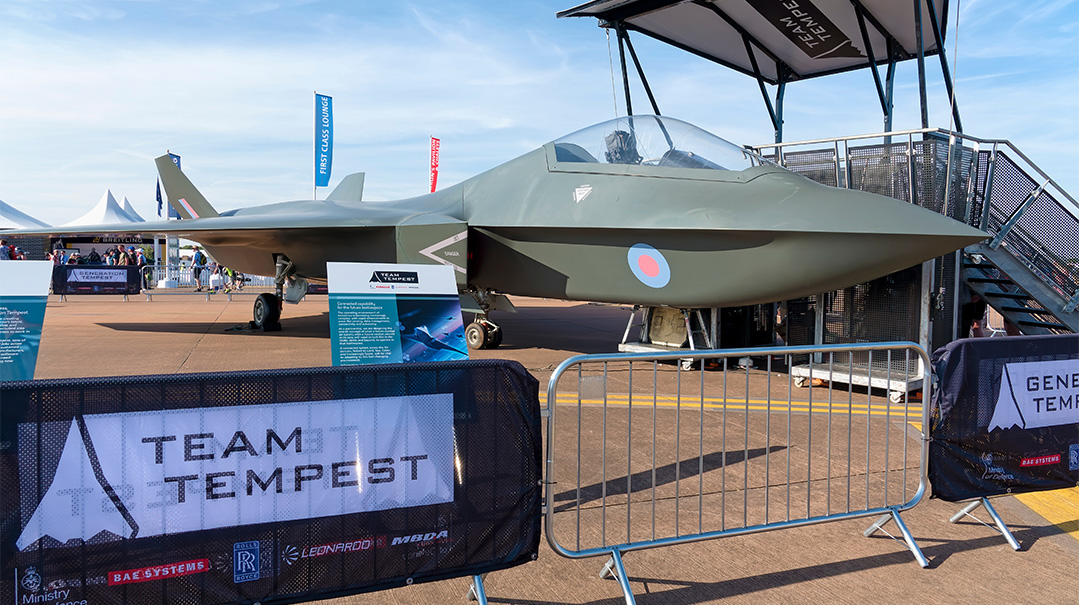Tempest in an East China Teacup

The UK’s decision to team up with Italy and Japan to build a new fighter plane

Tempest in an East China Teacup
With Russia’s war in Ukraine a reminder that military force is back on the agenda, global arms sales have grown by almost two percent over the past year. But some arms deals are more significant than others, and in that category falls the UK’s decision to team up with Italy and Japan to build a new fighter plane.
As the lead designer on the aircraft, Britain’s choice of design partners tells us about where the country sees its place in the world. Details about the Tempest, as the stealthy sixth-generation jet will be called, are sketchy, but the geopolitics behind it are clearer, involving the 21st century’s two superpowers — the US and China.
Beyond Europe
From the 1970s on, collaboration with other European countries gave Britain two previous fighters — the now-retired Panavia Tornado and the current front-line Eurofighter Typhoon. The inclusion of Italy — a collaborator on both planes — continues that tradition. But more significant is the fact that the Tempest project is the first military program not to include France or Germany, Europe’s industrial heavyweights. Instead, a consortium of the latter plus Spain are working on a competing design. The UK’s decision to go its own way is another signal that post-Brexit Britain is rebalancing away from Europe.
Asian Horizons
The real surprise of the new alliance is the selection of Japan, whose F-X future fighter program is being folded into the Tempest project. Like the trilateral AUKUS defense pact announced last year between the US, UK, and Australia, the latest move gives teeth to Britain’s oft-declared intent to pivot toward Asia as Europe fades and both China and India rise. Taken together, the defense realignment signals that far from turning in on itself, the UK is serious about retaining a global role after leaving the European Union.
Self-Defense
Japan’s decision to move ahead with Britain is significant because it’s the first time that Tokyo — a close military ally of the United States since World War II — has embraced another partner on a major defense project. Domestic development, rather than investing in a US-led project, such as Britain has done with the Lockheed Martin F-35 fighter, offers both Britain and Japan the chance to boost their arms industries. But the Tempest effort is also a sign that as the threat from China grows, Japan is determined to emerge from under America’s shadow.
Second Tier
In theory, America should celebrate a more assertive Japan. American politicians of all stripes have long complained of the cost of underwriting the defense of allies like Japan. It’s doubtful, though, that Washington will welcome competition in the international arms bazaar. But the proliferation of fighter programs is a sign that second-tier powers know that developing domestic military capacity — not simply spending more on US-made arms — is a means of gaining leverage and restoring balance vis-à-vis America itself.
Made in China
The Ukraine war may have focused European minds on the need to rearm, but for the US, Britain, and Japan, it’s Beijing’s burgeoning military power that’s the ultimate threat. America’s head start in stealth and other advanced military technology has been eroded by the quantum leaps that China has made in fighter design. If the Tempest faces off against Chinese warplanes in the East China sea, it will be far from a storm in
a teacup.
“Laïcité”
This French term that translates as secularism (related to the English “laity”) made news last week as an Israeli professor of immunology was attacked after he offended the secularist sensibilities of a French TV host for wearing a kippah on the program.
In the incident, reported by JTA, Dr. Cyrille Cohen was upbraided by Elisabeth Levy, a right-wing Jewish guest, on the CNews channel.
“You understand, don’t you, that our non-religious way of life is discreet,” she said. “It’s not against religion, but you should keep your religion to yourself.”
The exchange highlighted the gulf between the French idea of the separation of church and state and that found across much of the Anglosphere. Unlike the neutral public space envisioned by the American founders, France’s version — aped by Kemalist Turkey — calls for active secularism in public.
Hence, a 2004 law that bans wearing a yarmulke, burqa, or cross in public schools. That extreme law is the ultimate evidence that ideas matter, and that what starts as a philosophical debate on the finer points of governing systems can come down to unpleasant real-world actions.
History Desk
Which Vladimir Putin is the scariest —
the one who denies the Ukraine war is anything but a “special military operation” and threatens nuclear strikes, or the more balanced version who publicly acknowledged that Russia is struggling?
In The Yom Kippur War, a landmark history of the conflict, Abraham Rabinovitch suggests it’s the latter. He quotes an Israeli intelligence officer who noticed at the outset of the war a key difference in the behavior of Egyptian high command compared to the Six Day War.
In that earlier conflict, the officer recalled, Israelis had chortled at the “oriental imagination” that afflicted Egypt’s top brass, who spoke wildly of imaginary victories that would imminently sweep the Israelis into the sea.
The second time round, the officer noted, transcripts of internal enemy discussion revealed that the Egyptians were reporting their own losses accurately.
Clearheadedness in a foe is problematic. After ten months of conflict, is Putin’s newfound realism a sign that he’s more confident of prevailing in the long term, or that he’s preparing the ground to sue for peace?
$31.4 Trillion
This column takes an occasional look at the US national debt clock, currently displaying the mind-boggling number above, for the sole purpose of making the same point over and over again.
When the right cuts taxes, the left screams “national debt!” When the left pays students’ college bills, the right shouts “national debt!” But after all is said and done, no one cares; it has no traction as a political issue, and the country continues to rack up unsustainable debt to foist on the grandkids.
It’s fair to wonder whether, when $40 trillion worth of profligacy is marked, the only ones to do the marking will be the maintenance man on the Manhattan clock, and yours truly.
(Originally featured in Mishpacha, Issue 940)
Oops! We could not locate your form.






